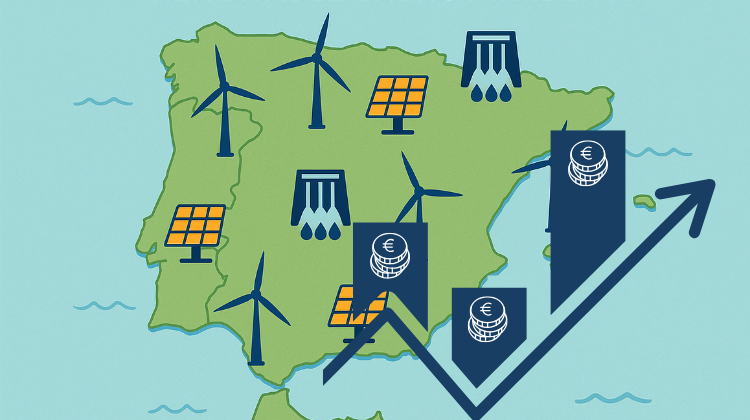The European Commission’s Spring 2025 Forecast projects a scenario of moderate yet stable growth for the European Union, with GDP increasing by 1.1% in the EU and 0.9% in the euro area. Within this framework, Spain and Portugal stand out for their positive performance, establishing a conducive environment to step up their renewable energy strategies.
In the case of Spain, the report anticipates GDP growth of 2.6% in 2025, moderating to 2.0% in 2026. This dynamism is underpinned by domestic demand, particularly private consumption, and a rebound in investment associated with the implementation of the Recovery and Resilience Plan (RRP). This macroeconomic context enhances the investment potential for energy transition projects, such as the recently announced cogeneration and green hydrogen initiatives.
“The Spanish economy will continue to benefit from the implementation of the RRP, especially in the area of public and private investment,” the report notes. This provides context for the decision by the Ministry for the Ecological Transition and the Demographic Challenge (MITECO) to launch auctions to allocate up to 1,200 MW of cogeneration between 2025 and 2027, as a key strategy to decarbonise industrial processes and allocate the pending MW of renewable auctions.
It is also worth noting that the European Commission has approved Spain’s €400 million plan to support renewable hydrogen production under the European Hydrogen Bank scheme, with the objective of deploying up to 345 MW of electrolyser capacity and producing 221,000 tonnes of green hydrogen.
However, the country must now focus on developing a robust strategy to stimulate new demand and accelerate the electrification of industry, transport, and residential sectors.
Meanwhile, Portugal also maintains a stable course, with projected growth of 1.8% in 2025 and 2.2% in 2026. Domestic demand will be the main driver, fuelled by expansionary fiscal policies and a gradual improvement in the labour market. The report indicates that Portugal’s public debt will fall to 89.7% of GDP by 2026, driven by primary surpluses and a favourable growth outlook.
Within this framework, Portugal has launched an auction schedule for 2 GW of offshore wind power before July 2025, reinforcing its commitment to decarbonisation. It has also awarded over 500 MW of storage capacity, albeit with significant technical requirements: 75% of battery charging must come from renewable sources, posing challenges to project viability.
“Portugal maintains a clear and progressive strategy towards decarbonising its energy mix, reinforcing its leadership in Southern Europe,” the report points out. These developments strengthen the country’s position in the race to attract international green investment.
In both cases, the combination of sustained economic growth, fiscal stability and access to EU funds creates optimal conditions for accelerating the energy transition. New auctions, storage projects, investments in grid infrastructure and the rollout of green hydrogen will enable the channelling of resources towards key sectors, aligning economic policy with the region’s climate objectives.






























